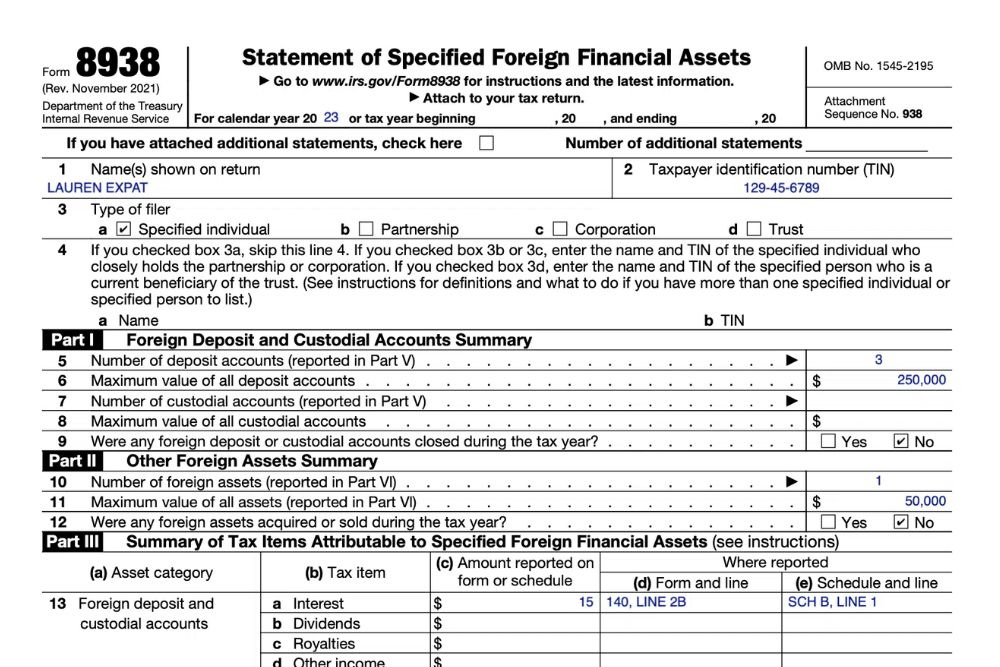FATCA Exemption: Who Qualifies & How to Avoid Reporting

- What Is FATCA, and Do I Need a FATCA Exemption Code?
- Who Has to File a FATCA Report?
- What Financial Assets Are Exempt from FATCA Reporting?
- Common FATCA-Exempt Financial Institutions:
- Are FATCA Reports and FBARs the Same?
- What If I Haven’t Filed a FATCA Report Yet?
- Still Have Questions Regarding FATCA Exemptions? We Can Help!
Under FATCA, many US expats are required to report their foreign financial assets to the IRS by filing Form 8938. However, some types of assets are exempt from this requirement.
Key Takeaways
- FATCA is a law passed by the US Congress that requires US citizens who have foreign financial assets to report those assets to the IRS.
- Failure to file correctly can result in IRS penalties.
- Some accounts and financial institutions qualify for FATCA exemptions.
- FATCA reporting is separate from Foreign Bank Account Reports (FBAR and has different filing requirements.
What Is FATCA, and Do I Need a FATCA Exemption Code?
The Foreign Account Tax Compliance Act (FATCA) is a US law that requires US citizens to report specified foreign financial assets that exceed certain thresholds. FATCA was originally passed to stop Americans from evading their US tax obligations by hiding money in offshore bank accounts. However, while the primary purpose of the law is to foil tax evasion, many expats get caught in the crossfire.
The good news is that not all Americans living overseas have to file a FATCA report.
Who Has to File a FATCA Report?
US citizens, Green Card holders, and tax residents must file a FATCA report if their foreign assets exceed certain thresholds. Your threshold depends on your filing status and where you live.
- Married taxpayers filing a joint return while living abroad must file a FATCA report if they own more than $400,000 in specified foreign financial assets on the last day of the year or $600,000 at any point during the year. When living in the US, these thresholds are just one quarter of these amounts.
- Everyone else who does not file as Married Filing Jointly and is living abroad must file a FATCA report if they own more than $200,000 in specified foreign financial assets on the last day of the year or $300,000 at any point during the year. When living in the US, these thresholds are also just one quarter of these amounts.
Who Is Exempt from Filing?
- Individuals whose foreign financial assets do not reach their reporting threshold
- Certain US government employees abroad (e.g., military or diplomats with exempt accounts).

What Financial Assets Are Exempt from FATCA Reporting?
According to the IRS, “Specified foreign financial assets include foreign financial accounts and foreign non-account assets held for investment (as opposed to held for use in a trade or business).” That category generally includes:
- Foreign bank accounts
- Foreign financial instruments
- Foreign stocks and securities
- Foreign pensions
- Foreign mutual funds
- Interest in foreign entities
- Foreign hedge funds
- Foreign life insurance
But for a clearer idea of which foreign assets to include when calculating whether you need to file a FATCA report, let’s look over which ones are exempt. There are exceptions to what needs to be reported on a FATCA report. Here is a list of exempt items:
- Cash
- Precious metals (such as gold and silver)
- Real Estate
- Foreign assets reported on one of the following IRS forms: 5471, 8865, 8858, 8621, and 3520
- Foreign Social Security equivalents
FATCA Reporting Table
| Asset Type | FATCA Reporting Required? |
| Foreign bank accounts | Yes |
| Foreign stock holdings | Yes |
| Foreign pension plans | Yes, unless reported on Forms 3520, 5471, etc. |
| Foreign life insurance | Yes, if it has a cash surrender value |
| Foreign-held real estate | No |
| Foreign Social Security equivalent | No |
| Foreign financial instruments | Yes |
| Foreign mutual funds | Yes |
| Ownership Interest in foreign entities | Yes |
| Foreign hedge funds | Yes |
| Cash | No |
| Precious metals (e.g., gold, silver) | No |
Common FATCA-Exempt Financial Institutions:
- Certain government-owned banks (e.g., Canada’s central bank)
- Foreign retirement accounts similar to US IRAs reported on other forms (e.g., Canadian RRSPs, if applicable)
- Foreign social security–like systems (e.g., Australia’s Superannuation)
When you live in the US, tax day is simple: April 15th! When you move abroad, it’s not so straightforward! Learn about all the expat deadlines and extensions you need to know to file.

Are FATCA Reports and FBARs the Same?
While FATCA reports and Foreign Bank Account Reports (FBARs) are similar, they are not the same. The filing thresholds for FBARs are much lower. Additionally, only financial accounts maintained within foreign financial institutions are reported on an FBAR. In contrast, a FATCA report covers foreign financial accounts and foreign financial assets held outside of a financial institution.
Here’s a breakdown of the key differences:
| Requirement | FATCA (Form 8938) | FBAR (FinCEN 114) |
| Who Must File? | US persons with foreign financial assets | US persons with foreign financial accounts |
| Filing Threshold | $200,000 (single) / $400,000 (joint) | $10,000 in one or more foreign bank accounts |
| Filed With? | IRS (with tax return) | FinCEN (separate from tax return) |
| Includes? | Investments, trusts, accounts, etc. | Only banks & financial accounts |
What If I Haven’t Filed a FATCA Report Yet?
The penalties for failing to file a FATCA report when required can be steep.
- Penalties start at $10,000 per violation.
- If the IRS contacts you and you still don’t file, they will add penalties of up to $50,000 for continued failure to file.
- The IRS can also levy a 40% penalty for understating tax attributable to non-disclosed assets.
If you haven’t filed a FATCA report yet, don’t panic. As long as you were unaware that you needed to file, you can use the Streamlined Filing Procedures to become compliant without facing any harsh penalties. You can file three years of tax returns and six years of FBARs penalty-free using this program.
For willful non-compliance with potential criminal liability, the Voluntary Disclosure Program may apply, reducing penalties but not eliminating them.
Still Have Questions Regarding FATCA Exemptions? We Can Help!
FATCA reporting is an extremely complicated endeavor, impacting a broad range of foreign individuals. Some individuals will be more affected than others, and some are not directly impacted. Taxpayers should understand what these changes mean for them and their tax filing obligations.
That’s where Greenback Expat Tax Services comes in! We would be happy to help you comply with IRS requirements through the Streamlined Filing Procedures or any other program best suited to your needs.
If you’re ready to be matched with a Greenback accountant, click the get started button below. For general questions on expat taxes or working with Greenback, contact our Customer Champions.



